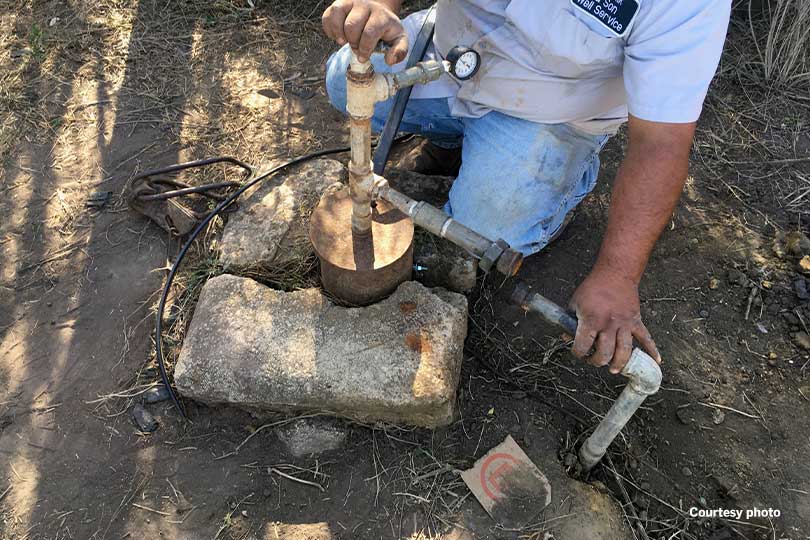When a submerged water well pump went out on his property in April 2020, Webb County Farm Bureau member Buddy Earles chalked it up to routine wear and tear.
After the well company pulled the pump for replacement, they said it looked like a lightning strike. He shrugged it off as just one of those things that happens and thought nothing more of it.
Until the same thing happened again in a matter of weeks. And then again. And then again, over and over.
Nineteen months and 12 pumps later, the mystery has been solved. The culprit? Leaking direct current (DC) voltage from a nearby pipeline.
“The odds of lightning striking 12 times in my semi-arid region with no rain was very, very slim. The odds of lightning striking the same place 12 times are…well, even slimmer than that,” he said. “But when we finally figured it out, you could’ve blown me over with a feather. The source was just totally unexpected. I’d have never thought of any DC leakage whatsoever.”
Those 19 months were an exercise in frustration and expense as Earles and a series of electricians and experts attempted to trace the cause.
After the second pump failed, Earles called his electric cooperative to check for any power surges from their lines. Finding none, he turned to replacing different sections of the electric system. But when a new meter, breaker box, timer, controller and about 500 feet of power cable failed to fix the problem, he and the electric company were at their wits’ end.
Without the careful investigation of a master electrician, the issue may never have been discovered.
“He found an article written by the manufacturer of the water pump that mentioned DC leakage coming from pipelines, cell towers and power lines. The companies run DC through the casing around the lines to keep the equipment from corroding,” Earles said. “And according to this article, all you need is 400 millivolts or higher of voltage leaking to start doing damage to the well pump.”
The DC voltage reading at the wellhead was 1.5 volts, the voltage of an AA battery.
The pipeline has been on the property since the couple bought the place in 2008, and his research shows it’s been there since at least 1953.
So, the idea the pipeline could somehow be causing the electric issues would normally seem farfetched. Except he remembered the month before the shorts began, in about March 2020, the pipeline company had uncovered some of the pipe to resurface it.
He contacted the pipeline company, who agreed to come investigate. About a mile-and-a-half away, one of the rectifiers had shorted out, spreading electricity to the ground and into the well pump motor.
The extra voltage reaching the well’s electric system caused each new motor to burn out. Earles noted when the pumps were pulled, they looked like they’d been in service for years.
At a minimum of $1,000 in costs per replacement, it was an expensive puzzle to solve. Thankfully, once the root of the problem was uncovered, the pipeline company has offered to pay for the damages.
“Even though the well company was replacing the pumps under warranty, there was still labor each time they came out. And of course, there was the cost of replacing all the system components when we thought it might not be grounded properly or something else was malfunctioning,” he said. “That doesn’t include all the stress of not knowing whether that pump was working and if I’d have water for my cattle, my time going out there to check the pump and just the worry and thought I put into this for that time.”
By sharing his story, Earles hopes to raise awareness among other landowners of the potential for electricity issues when easements are nearby.
“A cell phone tower, electric line, transmission pipeline or even an electric fence could be two or three miles away and still affect you if there’s any DC leakage. I hope getting this out there may help save somebody else the headaches, the concern and the stress of worrying why their pump went out all of a sudden,” he said. “It can be very expensive trying to figure things out, and it was just a simple fix. I just wanted to give other farmers and ranchers a warning in case it happens to them.”


Thanks for sharing, what a great find.
Thank you for this good information!
Good to know, thanks!
Good information to have. Thank you